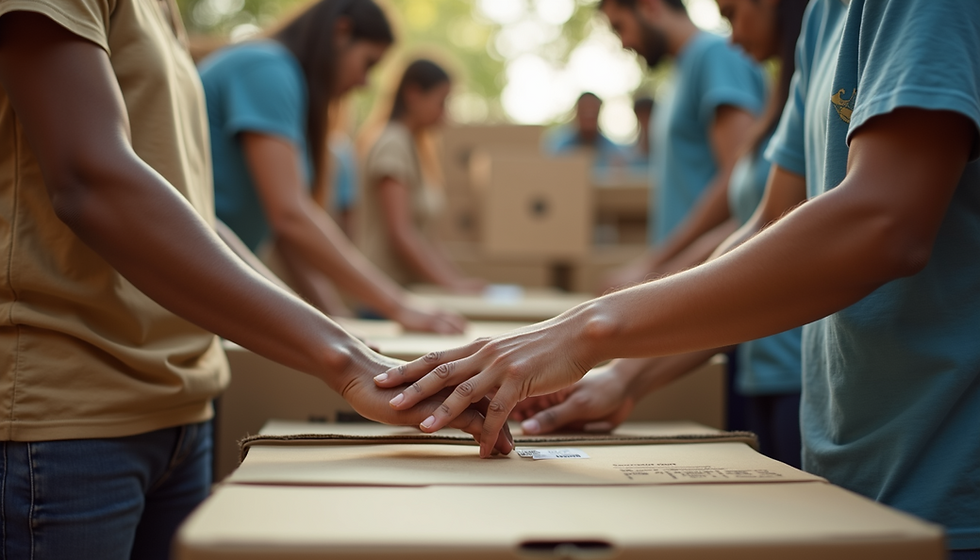Why Community Support Matters for Society
- kennmangena
- 2 days ago
- 4 min read
In times of crisis and uncertainty, the strength of a society often depends on the bonds that hold its people together. I have witnessed firsthand how local support can transform lives, especially in communities facing hardship. When neighbors, volunteers, and organizations unite, they create a safety net that catches those who might otherwise fall through the cracks. This blog post explores why local support is vital, what it looks like in practice, and how each of us can contribute to building a more resilient and compassionate society.
The Importance of Local Support in Times of Crisis
Local support is the heartbeat of any community, especially when challenges arise. It is the immediate response that neighbors offer when disaster strikes, the shared resources that help families survive tough times, and the collective spirit that refuses to let anyone face hardship alone. For Ukrainian communities affected by war and crisis, local support is not just a concept—it is a lifeline.
When local groups come together, they can provide essential aid quickly and efficiently. For example, distributing medical supplies, food, and winter gear to those in need can mean the difference between survival and suffering. Local support also fosters a sense of belonging and hope, reminding individuals that they are not isolated in their struggles.
The power of local support lies in its immediacy and intimacy. Unlike distant aid, it is rooted in personal connections and a deep understanding of the community’s unique needs. This makes it more adaptable and effective in addressing urgent issues.

What is a Support Community?
A support community is a group of people who come together to provide emotional, practical, and sometimes financial assistance to one another. These communities can be formal, like nonprofit organizations, or informal, such as neighborhood groups or online networks. The key element is a shared commitment to helping members overcome difficulties.
Support communities often focus on specific needs or challenges. For instance, some may assist families affected by conflict, while others might support individuals facing health crises or economic hardship. What unites them is the principle of mutual aid—everyone contributes what they can and receives help when needed.
In practice, a support community might organize food drives, offer counseling services, or coordinate volunteer efforts. They create safe spaces where people can share their experiences and find comfort. This sense of solidarity is crucial for mental and emotional well-being, especially in times of trauma.
By participating in or supporting these communities, we strengthen the social fabric that holds us all together. It is a reminder that no one is truly alone, and together, we can face even the toughest challenges.
How Local Support Strengthens Society
Local support does more than provide immediate relief—it builds resilience. When communities have strong networks of care, they are better equipped to recover from crises and prevent future hardships. Here are some ways local support strengthens society:
Promotes Social Cohesion
When people work together to help one another, trust and cooperation grow. This creates a more harmonious and stable community.
Enhances Resource Sharing
Local support encourages sharing of skills, knowledge, and material resources, making the community more self-sufficient.
Improves Mental Health
Knowing that help is available reduces stress and anxiety, fostering a healthier population.
Encourages Civic Engagement
People who feel connected to their community are more likely to participate in local decision-making and volunteerism.
Supports Vulnerable Populations
Local support ensures that those who are most at risk—such as displaced families or the elderly—receive the care they need.
By investing in local support systems, we create a foundation for long-term well-being and prosperity. It is a ripple effect—small acts of kindness and assistance can lead to widespread positive change.

Practical Ways to Foster Local Support
Building and maintaining local support requires intentional effort. Here are some practical steps anyone can take to contribute:
Volunteer Your Time
Join local organizations or initiatives that provide aid. Even a few hours a week can make a significant difference.
Donate Resources
Contribute food, clothing, medical supplies, or funds to trusted groups working on the ground.
Spread Awareness
Use your voice to highlight the needs of your community and encourage others to get involved.
Offer Emotional Support
Sometimes, listening and offering kindness is the most valuable help you can provide.
Create Networks
Help connect people who need assistance with those who can offer it. Building bridges strengthens the entire community.
Advocate for Policy Change
Support policies that fund and protect local support services and vulnerable populations.
By taking these actions, we become active participants in a cycle of care and resilience. The impact of local support is multiplied when many hands join together.
The Role of Organizations in Supporting Communities
Nonprofit organizations play a crucial role in coordinating and amplifying local support efforts. For example, the Spirit of Ukraine Foundation is dedicated to helping Ukrainian communities affected by war and crisis. They provide shipments of medical supplies, food, winter gear, and shelter essentials, while also supporting local relief efforts.
Organizations like this serve as hubs that connect donors, volunteers, and recipients. They ensure that aid reaches those who need it most and that resources are used efficiently. Their work is a testament to the power of organized local support in making a tangible difference.
Supporting such organizations, whether through donations or volunteering, is a meaningful way to contribute to the well-being of communities in crisis. Together, we can help ease suffering and bring hope where it is needed most.
Embracing the Spirit of Togetherness
In the end, the importance of local support is about more than just resources—it is about people. It is about the warmth of a helping hand, the comfort of knowing someone cares, and the strength that comes from standing together. When we embrace this spirit of togetherness, we build a society that is not only stronger but kinder.
I encourage you to explore ways to engage with your community and support those in need. Whether through small acts or larger commitments, your involvement matters. Together, we can create a world where no one faces hardship alone, and where hope shines brightly even in the darkest times.




Comments